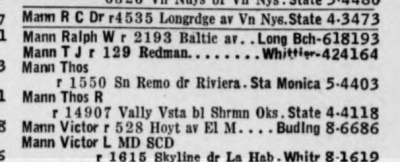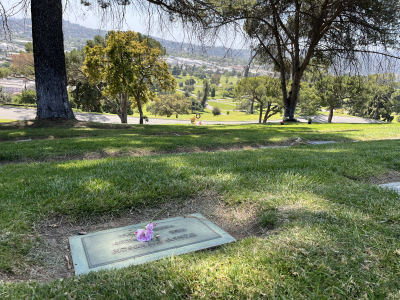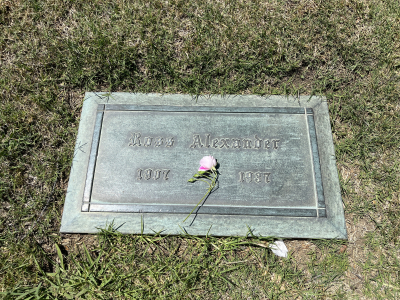Alex Ross's Blog, page 43
May 17, 2022
For Alexander Toradze
Alexander Toradze, one of the most formidable and passionate exponents of the music of Sergei Prokofiev, died on May 11 at the age of sixty-nine. I knew Lexo from several interviews over the years, and was charmed, as so many others were, by his amiable, boisterous personality. I last saw him in 2014, when he played Prokofiev's Third Concerto at one of Iván Fischer's midnight concerts with the Budapest Festival Orchestra. His recording of the Prokofiev cycle, with Gergiev conducting, is the one to which I usually turn.
May 16, 2022
The South Dakota Symphony
Basin and Range. The New Yorker, May 23, 2022.
May 11, 2022
May 10, 2022
A Pulitzer for Raven Chacon
Raven Chacon's Voiceless Mass, an immensely haunting piece for organ and ensemble, has won this year's Pulitzer Prize for music. Above is a video of the premiere, performed by members of Present Music, in Milwaukee. The other finalists were Andy Akiho, for his large-scale percussion score Seven Pillars, and Anne Leilehua Lanzilotti, for her string-orchestra work with eyes the color of time. I had the honor of serving on the jury this year, alongside John Luther Adams, Tania León, Du Yun, and Patrice Rushen. Several of Chacon's sound-art pieces can be seen in the current Whitney Biennial and also at the Vincent Price Art Museum, in East Los Angeles.
May 5, 2022
Let your fingers do the walking
May 4, 2022
A Guillermo Galindo moment
In 2012, as part of the John Cage centennial celebrations in San Francisco, the Mexican composer Guillermo Galindo collaborated with Mariachi Nueva Generación to produce a mariachi rendition of Cage's Variations II. The performance caused the audience some anxiety. I found the video at Sonic Terrains in Latinx Art, a fascinating exhibition at the Vincent Price Art Museum, in East Los Angeles.
May 1, 2022
Sioux Falls by night
April 26, 2022
April 18, 2022
For Radu Lupu
The arch-magus of the piano died yesterday in Lausanne, at the age of seventy-six. For me, Lupu was the supreme living practitioner of his instrument, a musician and artist of the highest order. I wrote about him many times, always struggling to grasp the elemental mystery of his sound and style. None of the verbiage seems adequate in retrospect, but I tried my utmost. From a New York Times year-end piece in 1994:
Radu Lupu is a strange, wizardly presence at the piano, and his recital in January had the atmosphere of a seance. He indulged, as always, in eccentricities, but his lustrous tone and easeful grasp of the longer musical line mesmerized a Carnegie Hall audience. The final movement of Schumann's Fantasy in C turned into never-ending waves of lyric warmth, and the encore of Brahms's Intermezzo in A (Op. 118, No. 2) was too beautiful for words. Ghosts of the Romantics hovered behind him.
From a Times review of a Carnegie recital in 1996:
It is difficult to describe exactly what happens when Radu Lupu's fingers meet the piano. There are no flamboyant gestures, dazzling technical feats, startling interpretive notions. No grand personality hurls the music at the listener. What happens first is that the piano gives out a narcotically beautiful tone; solitary lines or open intervals take on a luminous sheen. Subtle dynamic shadings, lucid inner voices, well-turned rhythms and songful phrasings follow — beyond that, nothing, or something uncannily like the music itself.
From a round-up of favorite Brahms recordings in 1996:
For many years, Radu Lupu has been in the habit of ending his piano recitals with selections from Brahms's final piano pieces, the Intermezzos (Op. 117) and the ''Klavierstucke'' (Opp. 118 and 119). Those moments are usually among the most memorable of any season. Each of these works makes a world from a handful of notes; Mr. Lupu plays them slowly, simply and with hypnotically lovely tone. His 1970's recordings, collected on a London CD, come as close to musical perfection as you could ask.
From a 2005 New Yorker column:
In 1970, he made a recording of Brahms’s Intermezzos Opus 117 that is in my personal pantheon of the most beautiful piano records ever made. At a Carnegie recital in 1996, Lupu offered as his last encore the slow movement of Schubert’s “Little” A-Major Sonata, and it wasn’t so much a performance as a glimpse of a perfect world. No pianist gets a lovelier tone out of the instrument. How he does it is a bit of a mystery: the piano is, after all, an impersonal machine of levers and hammers. But an A above middle C sounds different under Lupu’s finger. It glows from within.
I never met Lupu, but I heard some delightful stories about him. He was magnificently indifferent to the anxious routines of the classical business, refusing interviews. He made relatively few recordings, and none of them captured the mesmerism of his live appearances. Here's a passage from my 2008 piece about Mitsuko Uchida at Marlboro:
Her warmest words were for the Romanian pianist Radu Lupu, whom she calls “the most talented guy I have ever met.” She describes how she once tried to get Lupu to visit Marlboro. “I got very excited, describing how people do nothing but play music all day long. But he said no. His explanation was very funny. ‘Mitsuko,’ he said, ‘I don’t like music as much as you.’ ”
I last heard Lupu in 2012, in Paris. After the Brahms D-minor concerto, he offered, as an encore, Op. 117 No. 1, a piece that lies as close to me as any. For many years, I had been waiting in vain for a chance to hear Lupu play it; on that night, it felt like a private gift, even though he had no idea I was there and probably had no idea who I was. Such is the relationship between great artists and all of us out here in the dark.
April 15, 2022
At the grave of Lubitsch
The master of sophisticated uproar rests in verdant peace. In another part of Forest Lawn lies my near-namesake Ross Alexander, a bright-eyed actor who came to a very sad end.
Previously: Korngold, Salieri, Bruckner, Liszt, Georg Trakl, Willa Cather and Edith Lewis, Thomas Mann, Bach, Nietzsche, Monteverdi, Koussevitzky, Michael Furey, Luranah Aldridge, Ligeti, Frescobaldi, Villiers de l'Isle-Adam, Baudelaire and Beckett, Nadia and Lili Boulanger, Stravinsky and Nono, Zemlinsky, Schnittke, Fibich, Xavier Scharwenka, Elliott Carter, Enescu, Rachmaninov, Mahler and many others, Russ.
Alex Ross's Blog
- Alex Ross's profile
- 425 followers







